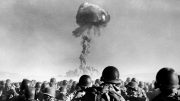Dr. Sonnenfeld is the Yale School of Management’s Lester Crown professor of management practice. He has spent 45 years researching corporate social responsibility. Mr. Tian is the Yale Chief Executive Leadership Institute’s research director.
Around 200 American corporations left South Africa in the second half of the 1980s, primarily in protest of the country’s apartheid system. South Africa’s segregationist president, P.W. Botha, came under increasing economic pressure as businesses fled the country.
The business exodus helped to bring apartheid to an end, and it was a powerful demonstration of corporate power. When people have the courage to utilize their power for good, it can help overturn oppressive regimes.
We’ve seen a similar broad response from the corporate sector to Russia’s war in Ukraine over the last six weeks.
According to data obtained by our team of 24 researchers at the Yale School of Management, hundreds of American companies have indicated that they are voluntarily reducing or halting their business in Russia.
While it’s impossible to determine whether all of these businesses are acting solely on moral grounds, they’ve all gone above and beyond what international sanctions require.
It’s too early to say whether their actions will force Russia to cease the conflict. However, sanctions imposed by Ukraine’s supporters have already wreaked havoc on Russia’s economy. The Russian stock market is on a drip, and the Kremlin has put in a lot of rules to keep the ruble’s value up.
Companies have a role to play in keeping President Vladimir Putin under economic pressure. In order to do so, our team divided firms into five categories based on how they responded to the war.
Consumers should know whether the corporations that provide their food, clothing, and other items are fully committed to putting an end to Mr. Putin’s crimes.
Our goal is absolute, and some might even call it extreme: every company with a presence in Russia must publicly commit to ceasing all operations there.
Russians who rely on the food, medication, or jobs produced by these enterprises may face hardship. But corporations must do whatever it takes to prevent Mr. Putin from killing innocent Ukrainians.
We are aware that some businesses already conduct business with authoritarian and deadly regimes all over the world. But here is your chance to make a difference by drawing a line with one country over one unwarranted war of aggression.
Here are some of the most well-known businesses that are leaving Russia, as well as corporations that are remaining in the country and supporting Mr. Putin through their imports, exports, and taxes.
Leaving the Russian Federation
At least 253 businesses have said they’re leaving Russia, leaving almost no operational footprint behind.
BP, ExxonMobil, and Shell have announced that they will sell billions of dollars’ worth of Russian energy assets.
BP’s chief executive, Bernard Looney, indicated that the invasion had forced the company to reconsider its posture in Russia. “I am certain that the decisions we have made as a board are not only the correct thing to do, but also in the best interests of BP in the long run,” he said.
Stanley Black & Decker, a tool and household goods company, also ceased business in Russia, potentially foregoing millions of dollars in profit. According to estimates, the company’s Russian business generates roughly $150 million in sales every year.
Activity is paused
At least 248 companies have stopped all or most of their business in Russia, but they haven’t quit or sold all of their assets.
Many of these companies have stopped doing business in Russia but are still paying their Russian staff, leaving the possibility of a return open. Adidas, Disney, IBM, and Nike are all examples of this.
Activity is being reduced
At least 75 corporations have shut down a large section of their operations in Russia.
For example, PepsiCo has ceased production of all of its sodas in the United States, including Pepsi-Cola, 7Up, and Mirinda, but not of its dairy products. This category also includes JPMorgan and Goldman Sachs.
Both companies have stated that their operations in the region are coming to an end. However, the companies haven’t completely sold off their investments in Russia. They’re still reportedly buying low-priced Russian stocks from companies that have already sold them.
Investments are being halted
At least 96 corporations have officially stated that they are deferring new investments in Russia but are otherwise operating in the country as usual.
Many of these businesses have justified their move by claiming to provide “essentials” to Russian citizens. It’s unclear what the corporations consider to be an “essential” good.
Mondelez International, which owns Nabisco and other snack companies, has pledged to reduce all “non-essential” activities while “assisting in the food supply’s continuity.” Until Mr. Putin decides to stop killing Ukrainians, we’re confident that Russians can live without the company’s chewing gum and chocolates.
Keeping the faith
At least 162 businesses haven’t made any big changes to how they run their businesses or what they do in the country on their own.
Some of these firms have made donations to foreign humanitarian organizations or announced vague re-evaluations of their activities in Russia, but they have not taken any meaningful steps to cease or restrict their business there, beyond what international sanctions require. Others have made no mention of the fighting.
Koch Industries, which manufactures items such as Brawny paper towels, Quilted Northern and Angel Soft toilet paper, and Dixie cups, employs roughly 600 workers in Russia. The corporation has criticized Russia’s incursion, and the plant’s operating affiliate has halted new investments in Russia.
On the other hand, it refuses to close its manufacturing operations, claiming that if it did, Russia would nationalize them. That could be the case. But it’s a risk that hundreds of other firms have taken by withdrawing from Russia, and it’s a risk that a multibillion-dollar corporation like Koch can afford to take.
International Paper’s attitude has been even more cautious. International Paper has informed us that it is reconsidering its 50% ownership in Ilim Group, a Russian forest products company, after we published our data. International Paper, on the other hand, had yet to divest from Ilim Group as of April 1.





